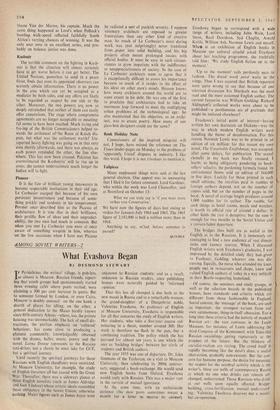AMONG SOVIET WRITERS-2
What Evashova Began
By DESMOND STEWART IF Peridelkino, the writers' village, is pub-less, so almost is Moscow. Russian friends, report- ing that youth groups had spontaneously started three evening cafes where poets recited, were claiming a 300 per cent increase in quota. But to someone formed by London, or even Cairo, Moscow is doubly unusual: on the one hand, a dearth of places for idling; on the other, a general dedication to the Muses hardly known since fifth-century Athens--where, too, the private bdusing was unremarkable. The lack of small dis- tractions, the puritan emphasis on 'cultured'. behaviour, has come close to producing a platonic community, knowledgeably obsessed with the drama, ballet, music, poetry and the novel. Lorna Doone represents to the Russian taxi-driver, not a classic he must take for GCE, but a spiritual journey.
Until recently the spiritual journeys for those Russians with English chauffeurs were restricted. At Moscow University, for example, the study of English literature all but ceased with the Great War. Thereafter, there was a sideways glance at those English novelists (such as James Aldridge and Jack Lindsay) whose artistic ideals resembled those obligatory in the Soviet Union; otherwise nothing. Major figures such as James Joyce were
unknown to Russian students; and 'as a result, unknown to Russian readers, since publishing houses were naturally guided by 'informed
That this has all changed is due both to the new mood in Russia and to a remarkable woman, the grand-daughter of a Deceobrist noble, Valentina Evashova. As professor of English at Moscow University, Evashova is responsible for all that concerns the study of English writers. Her students, who take a five-year course cul- minating in a thesis, number around 300. Her work is therefore no flash' in the pan, but a continuing tradition. The policy which she has pursued for alffiost ten years is one which she sees as 'building bridges' between her circle of students and British authors.
The year 1955 was one of departure. Dr. John Simmons of the Taylorian, on a visit to Moscow UniVersity, then celebrating its 200th anniver- sary, suggested a book-exchange. He would send new English books from Oxford, Evashova would reply with Russian. This was a major rent in the curtain of mutual ignorance.
At the same time, with an enthusiastic patience (the slow posts sometimes meant a month for a letter to receive its answer), Evashova began to correspond with a wide range of writers, including John Wain, Lord Snow, Basil Davidson, Syd Chaplin, Arnold Kettle, William Ash, Norman Lewis and myself. Whe* at an exhibition of English books in Moscow our cultural attache asked Evashova about her teaching programme, she truthfully told him : 'We study English fiction up to the moment.'
'Up to the moment' sails perilously near to fashion. The dread word passé waits in the wings. Thus I was assured that British reporters were quite wrong to say that because of one televised discussion' Iris Murdoch was the most read and the most esteemed English author. The current favourite was William Golding; Richard Aldington's collected works were about to be published—a posthumous act of gratitude that might be imitated elsewhere?
Evashoves initial point of interest—having written her own doctorate on Dickens—was the way in which modern English writers were handling the theme of decolonisation. For this reason Norman Lewis was to be printed in an edition of six million; for this reason my own novel, The Unsuitable Etgishmatt, was accepted, after some delays, for publication. The- sexual clemetit in my book was finally excused. I learnt, as being obligatory pandering to book- sellers' salacity; the pardoning formula found, its anti-colonial theme sold an edition of 164,000 in five days. Luckily for those printed in such small editions, the royalties paid in roubles to foreign authors depend, not on the number of copies sold, but on the number of pages in the book. A novel of average length produces around 1,000 roubles for its author. The rouble, for such things as hotel rooms, meals and watches, is worth its official ,rate of around a dollar; in other fields the rate is deceptive; but the sum is enough for two months in the Soviet Union and a caviare-laden departure.
The bridges thus built are as useful to the English as to the Russians. It is immensely en- couraging to find a new audience of vast dimen- sions and kpenest interest. When I discussed English writers with Evashova's graduates, I was impressed by the detailed study they had.given to Faulkner, Golding, whoever one was dis- cussing. Equally, the nurse who attended My knee, people met in restaurants and shops, knew and valued English authors of today in a way unlikely in their Beatle-respecting homeland.
Of course, the seminars and study groups, as well as the selection boards in the publishing houses, have standards and criteria which are different from those fashionable in England. Social content, the 'message' of the book, are seen as important; the strongest variant from our own autonomous, thing-in-itself obsession. For a long time these criteria had the naivety of modern Russian art: the vast canvases in the Lenin Museum, for instance, of Lenin addressing the third Congress of the Komsomol, with Tuke-like Russian swainlings gazing rapturously at the prophet of the future. But the blinkers of socialist-realism are rotting. The creed itself is rapidly becoming like the deist's deus. a useful abstraction, probably non-existent. But the con- cern for humane purpose, the desire for meaning, the respect for the cerebral activity which is the writer's, these are wells of contemporary' Russia at which no one who drinks can remain un- changed, unheartened. Those Russians who drink at our wells seem equally affected. Bridge' building, cross-fertilisation, mutual understand- ing: Valentina Evashova deserves not a medal• but co-operation.






























 Previous page
Previous page